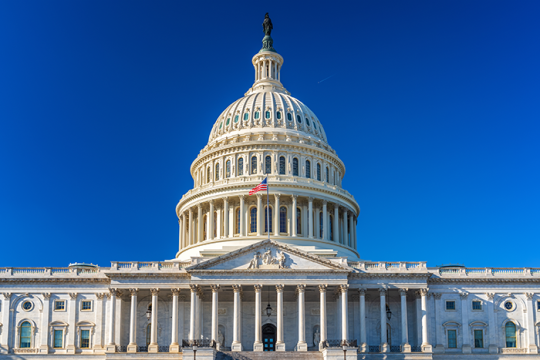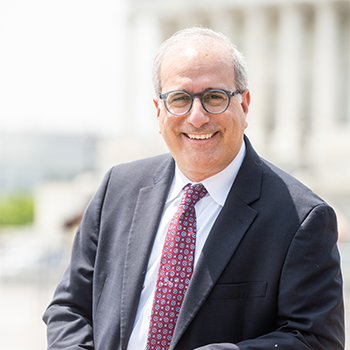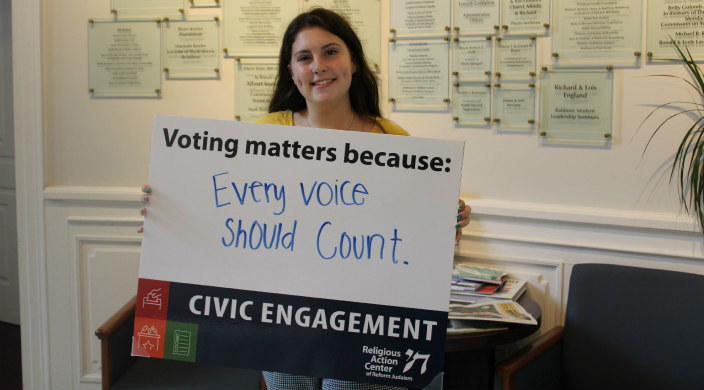
Six months ago, when the Reform Movement launched our Civic Engagement Campaign, run by the Religious Action Center of Reform Judaism, we set ambitious goals to empower and engage 100,000 people in the democratic process.
In NFTY regions, camp communities, college campuses, and congregations across the U.S., we registered and turned out voters, built meaningful relationships with candidates, worked to ensure that underrepresented communities had the resources to vote, and advocated for state ballot initiatives that aligned with our deeply held Jewish values.
As I looked ahead to this U.S. Midterm Election Day, I imagined it would be a day to proudly reflect on the robust engagement of our Movement around issues of importance to them.
Then, on October 27, 11 congregants were gunned down during morning worship at the Tree of Life Synagogue in Pittsburgh – changing the context of this Election Day in ways we couldn’t have imagined.
We are still grieving, and we are still afraid. Yet, as we are reminded by Hillel’s command in Pirkei Avot, “Do not separate yourself from the community” – even in this deeply painful time for the Jewish community, we still must show up (2:4). This election will impact how our nation addresses the treatment of refugees and immigrants, the profound challenge of gun violence, the erasure of the transgender community, and so many other critical issues.
I find comfort in the resilience of our community and the incredible mobilization we have seen throughout this campaign.
Reform Jews from nearly 1,000 communities in 43 states participated in the campaign, and together we engaged 100,253 Americans in the democratic process. We registered 4,117 people to vote and organized 17 candidate forums. Reform Jewish youth stepped up and joined the campaign in full force: More than 8,000 college students participated, and civic engagement programming took place at seven NFTY events and at nine URJ camps, engaging hundreds of teens and young adults.
Beth Israel Congregation in Jackson, MS, hosted a judicial candidate forum where congregants discussed issues of racial justice and criminal justice reform. More than 400 people attended a debate between congressional candidates in Pennsylvania’s 4th District, hosted by Reform Congregation Keneseth Israel in Elkins Park, PA. In Illinois, both gubernatorial candidates, Bruce Rauner and J.B. Pritzker, spoke at RAC-Illinois forums.
Judea Reform Congregation in Durham, N.C., trained 50 congregants, who in turn contacted every family in the community, urging them to vote and informing them of the congregation’s opposition to a voter ID amendment on the ballot. Congregation Shaare Emeth St. Louis, MO, compared their membership roster to the publicly available list of registered voters in their county and then contacted every eligible congregant who was not registered to vote – even helping some congregants discover that they had been mistakenly removed from the voter rolls. Instead of trick-or-treating, a NFTY teen in Washington state spent Halloween going door-to-door to make sure neighbors were planning to vote.
In Ohio, California, Florida, Washington, and Massachusetts, Reform Jews mobilized and contacted over 10,000 voters around ballot initiatives for groundbreaking criminal justice reform, affordable housing, voting rights restoration to over one million citizens, and transgender rights protection, respectively. Across the United States, Reform Jews made hundreds of calls to Florida voters, urging them to vote to restore voting rights to 1.4 million citizens with previous felony convictions who have served their full sentence. Leaders with the Ohio Religious Action Center collected more than 7,000 signatures to get the Neighborhood Safety Drug Treatment and Rehabilitation Amendment on the November ballot, and organized days of action in six cities statewide to educate voters about the importance of treating substance abuse as an illness, not a crime. In Massachusetts, Reform Jews partnered with Keshet to preserve protections for transgender individuals in public places through town halls and community canvass days, and 10 congregations statewide hosted their own events as well.
These are just a handful of the incredible achievements of our Movement throughout this election season. When our entire Movement, from camps and NFTY regions to congregations and statewide projects, mobilizes around a goal, we can harness tremendous power.
And we’re not done yet.
Our sacred duty to participate in civic society doesn’t end on Election Day. Democracy happens 365 days a year, and we must be fueled by the momentum of this civic engagement campaign to continue showing up, continue engaging our friends and neighbors on issues that resonate with our values, and continue to speak truth to power across North America.
Here are three ways you can help continue the momentum of the civic engagement campaign in the weeks and months ahead:
1. If you haven’t already voted, please do so today.
You can find your polling place and more information on how to vote at rac.org/CivicEngagement. Absentee ballots will be counted as long as they are postmarked by Election Day. While you’re at it, encourage 5 friends or family members to vote today, too!
2. Debrief the elections with us on Facebook Live.
Join RAC Director Rabbi Jonah Dov Pesner on Wednesday, Nov. 7, at 4 p.m. EST for a Facebook Live debrief conversation about the midterm results, and register for our Movement-wide in-depth election analysis, featuring NAACP President Derrick Johnson and Vanita Gupta, president of the Leadership Conference on Civil and Human Rights, on Sunday, November 11 at 3:30 p.m. EST.
3. Register for the RAC’s 2019 Consultation on Conscience (May 19-21), our biennial social justice leadership conference.
Held over three days in Washington, D.C., the Consultation on Conscience is dedicated to training and empowering Jewish leaders like you to make real, lasting change at the national, state, provincial, and local levels. Register to lead or attend in a Delegation from your congregation to build and strengthen the team that will help drive your congregation’s social justice work forward. Learn more at rac.org/consultation.
While today we may head to the polls with heavy hearts, we also vote proudly, fueled by the power of all we have accomplished and with optimism for the better future we will build together.
Related Posts
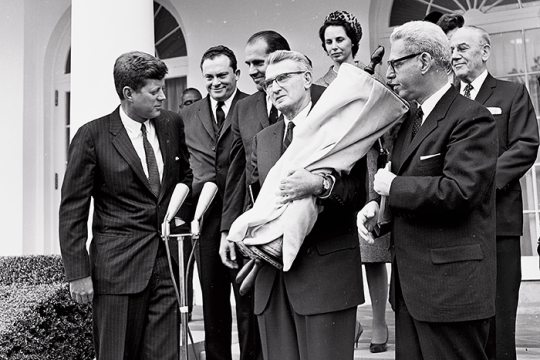
The URJ at 150 and Founding of the RAC
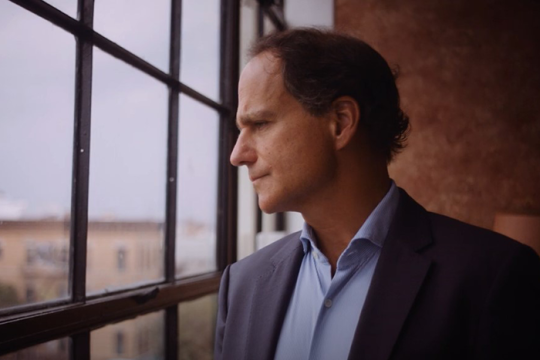
Justice for All People Everywhere: An Interview with Rabbi Jonah Pesner
